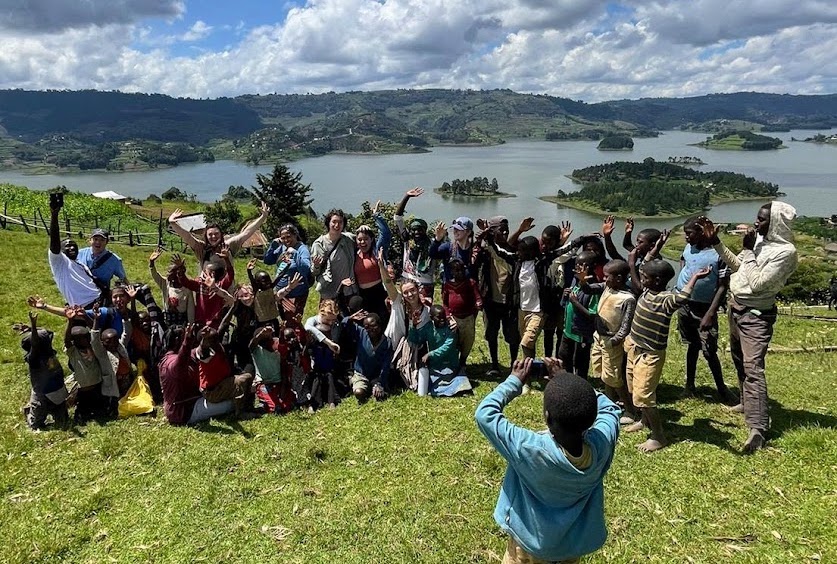
President’s Leadership Program students take a picture near Lake Bunyonyi.
A small group of CSU students who traveled to Uganda and Rwanda as part of their involvement in the President’s Leadership Program has been forever changed by the experience.
The seven students, who are in various stages of work for a minor in Interdisciplinary Leadership Studies through PLP, spent 14 days in May in East Africa on the program’s first international trip since the pandemic. A major focus of the experience, which is facilitated by SLiCE (Student Leadership, Involvement, and Community Engagement), is expanding students’ cultural awareness (CQ).
According to Dylan Johnson, the SLiCE program coordinator for leadership development who accompanied the group on the trip, CQ can be described as an understanding of how culture impacts how we do things, including how we communicate, what foods we eat, or even how we interact socially or for work.
“Students are looking into how social empowerment, climate change, adaptation, sexual health and advocacy – even plastics – impact daily choices,” he said.
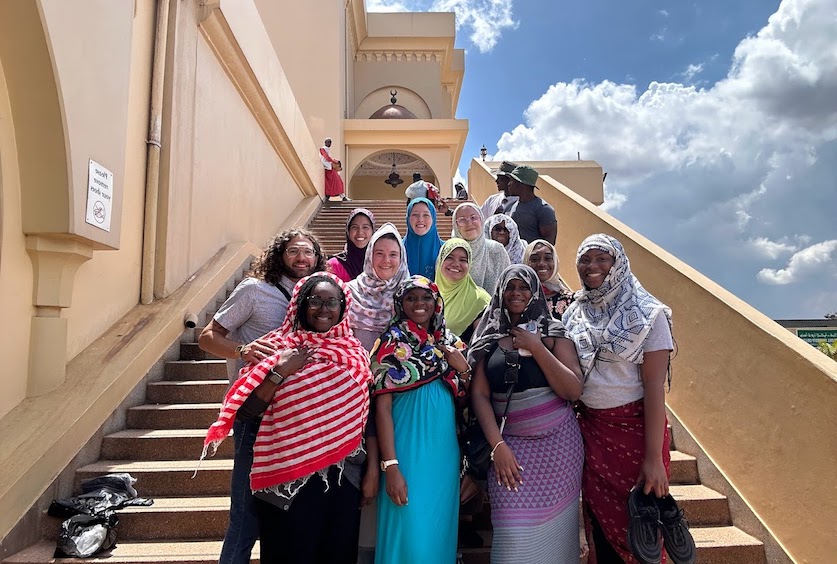
Students from CSU and Benedict College in South Carolina at the Gaddafi National Mosque in Kampala, Uganda.
In widening their cultural awareness, students in the program are asked to appreciate the differences between their own culture and others, to consider how values in other cultures can be equally as valid as their own, and to examine how varying values can drive decision-making on a larger scale.
“On this trip,” Johnson said, “we hoped to cultivate an understanding that there is a broader definition of leadership globally, and how cultural values impact leadership. Specifically, we asked the question: ‘How does collectivism (group before individual) impact leadership?’”
Getting ready
In preparation for their trip, students completed eight weeks of pre-trip meetings that introduced cultural information and values that would help them engage respectfully in the countries they planned to visit. They were to be accompanied on the trip by Johnson, Mo Moreira (assistant director of the President’s Leadership Program) and Kathryn Conrad (basic needs program coordinator for SLiCE).
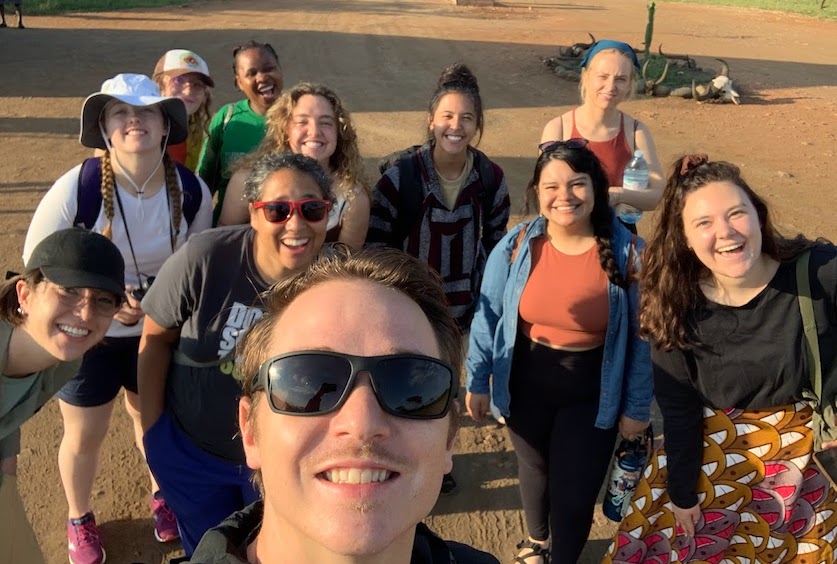
PLP students get ready to embark on a Ugandan safari in Queen Elizabeth National Park.
“We introduced the Sub-Saharan vs. American cultural value difference of ‘being’ as opposed to ‘doing,’” Johnson said. “It’s about how Ugandans engage with time – nothing is late, time is just a construct. As Americans, we measure time by how much we do. There’s a difference in how they develop relationships, too; they kind of flip our construct around: ‘Don’t just do something, sit there!’ Students were challenged to learn how to ‘just be.’”
To help students feel more comfortable with the notion, Johnson – who had been to Uganda with a non-governmental organization nine times before and who has a cousin who married a Ugandan – asked a friend on campus to speak with them in more authentic detail.
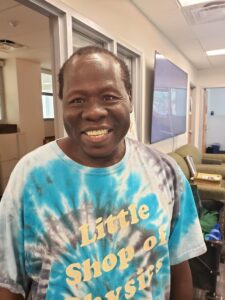
“I asked Robert Serunjogi to come over and introduce Ugandan culture to our students and tell them what to expect,” Johnson said. “He lives the culture. For example, in Uganda, they believe that you greet everyone first thing when you enter a room – collectively, you have to introduce yourself before you can be an individual. That is Robert!”
A CSU employee of 20 years, Serunjogi was born in central Uganda, in a small town called Luweero. With help of a CSU alumna, he has raised tens of thousands of dollars to construct schools there. Serunjogi, who volunteers for CSU’s Little Shop of Physics and works as a custodian at the university, agreed to meet with the PLP students to teach them about East African culture. His discussions around social engagement, including greeting people and sharing meals, and social hierarchies, including familial relationships and economic systems, helped inform students about Ugandan societal values.
His conversations, which were part of pre-trip meetings months before for trip, covered everything from the preparation of food and modes of transportation to clothing styles, education and music.
“I try to help them prepare for Ugandan culture, because sometimes American culture is much different,” Serunjogi said. “In America, the individual is first, but for the Ugandan, everyone works together, everyone is important, it’s collectivism. People help people, support their families, and look after their neighbors.
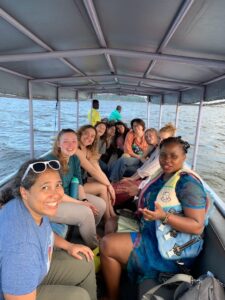
“In Uganda, we are very friendly for strangers,” Serunjogi said. “It’s important to take time to sit with someone. We greet with food – we say, OK, get a plate, and introduce us.”
Getting there
Once on the trip, students participated in a scavenger hunt in Kampala, went on a safari in Queen Elizabeth National Park, and stayed at Entusi Resort on Lake Bunyonyi, courtesy of their host organization, Global Livingston Institute in southwestern Uganda. From there, they ventured to Kigali, Rwanda, where they visited the Rwanda Genocide Memorial. Students had two opportunities to meet up with students (Ugandan and Rwandan) their own age, Johnson said.
“For a number of students, it was their first time going on an international trip. I loved giving them that opportunity to appreciate it and not do harm, and to learn with other university students,” Johnson said. “Students left with more relationships they built rather than experiences they had.”
A favorite experience of the trip was visiting Thread of Life, a Ugandan business operated by Florence Bugembe that helps empower single mothers. Thread of Life teaches crafts, such as sewing, to create items to sell to support their families and get out of the slums. Florence’s perspective challenged students to venture outside of their comfort zones, Johnson said.
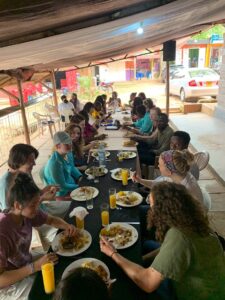
“Our first impression was getting to know about her organization, Thread of Life,” said Valeria Valles Castañeda, a third-year PLP student. “It is a program that focuses on women regaining their independence. It was clear to me that she is such a person, based on the stories she told of the women she has helped. Her caring ways did not stop there, however. Throughout the trip she made the effort to know every person that was traveling and then provide them with what they needed. She would offer hugs at the perfect time, make home remedies to cure a cold, make the best luwombo in all of Uganda, and make us laugh when it was needed.
“The last night of the trip, Florence went around the table and expressed gratitude to each individual person on the trip,” she continued. “Her words and reflection will always be something I carry with me. I have never-ending love for her and all that she taught me. I feel so lucky to have someone care and support me all the way from Uganda.”
PLP’s three-year, 14-credit leadership development experience has a stated mission “to develop active, informed civic leaders who practice ethical, inclusive leadership and embody positive humanitarian characteristics, such as optimism, service to others, passion, mindfulness, and fairness.” If students participate in all three years of PLP, they are eligible to earn the Interdisciplinary Leadership Studies minor. Find out more here.
Read more about student experiences on this trip, in their own words.